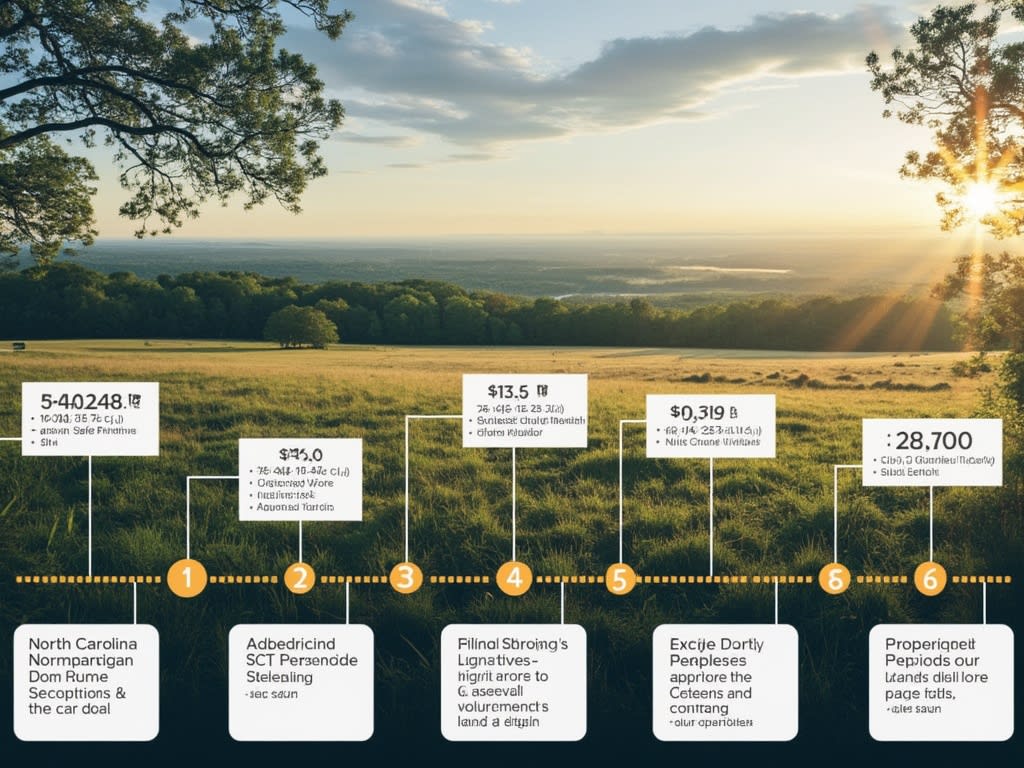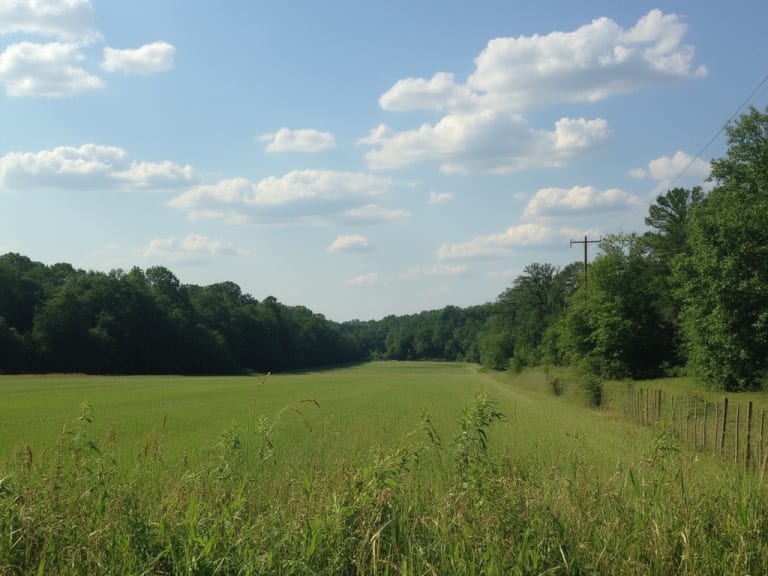North Carolina land sales vary dramatically in timeline, ranging from 6 months to 3 years depending on key factors like price and location. Properties near major highways, coastal areas, and expanding cities such as Charlotte, Raleigh, or Wilmington move faster on the market. North Carolina properties with existing utilities and clear zoning commands attention, selling up to 60% quicker than undeveloped acreage without entitlements.
Key Takeaways
- Properties listed below market value typically close within 6-12 months, while those at market rate need 12-24 months
- Urban and suburban lots change hands faster (3-6 months) than rural land (6-12 months)
- Ready-to-build lots with infrastructure and utilities attract buyers more quickly
- Active buying seasons peak from April through August, with faster transactions
- Multiple selling options exist: land buying companies offer efficient closings (7-14 days), real estate agents secure higher prices but charge 6-10% commission, and state law requires attorney oversight
Typical Timeline for Selling Land in North Carolina
Standard Market Timelines
I’ve seen vacant land sales in North Carolina take anywhere from six months to three years, with the price point being the key factor in determining sale speed. Land listed below market value typically sells within 6-12 months. Properties priced at market value need 12-24 months to find the right buyer. Overpriced lots can sit for two years or longer without any serious offers.
Factors Affecting Sale Speed
Several elements impact how quickly your land will sell. Here are the main considerations:
- Location relative to growing urban areas
- Access to utilities and roads
- Zoning restrictions and building potential
- Current market conditions
- Seasonal buying patterns
- Marketing strategy effectiveness
- Property documentation readiness
Setting the right price from the start cuts months off your selling timeline. Land that starts overpriced often ends up selling for less than if it had been priced correctly initially.

Location and Property Characteristics That Speed Up Sales
Key Factors Affecting Sale Speed
Land near major highways, coastlines, and growing cities in North Carolina consistently sells faster than remote parcels. Properties within a 30-minute drive of Charlotte, Raleigh, or Wilmington move particularly quickly in the current market.
I’ve found that entitled land with clear zoning approvals sells up to 60% faster than raw, unentitled acreage. Buyers prefer land where they can start development right away without lengthy permit processes.
Here are the specific characteristics that speed up land sales in North Carolina:
- Cleared and graded lots vs. raw woodland (cleared lots sell 40% faster)
- Existing utilities and road access
- Proximity to schools, shopping, and employment hubs
- Current zoning allowing immediate development
- Level topography requiring minimal site work
- Recent soil percolation tests
- Clearly marked property boundaries
- Absence of wetlands or environmental restrictions
Urban and suburban parcels typically sell faster than rural ones, with an average time of 3-6 months versus 6-12 months for rural properties. However, rural land near popular recreational areas or with strong agricultural potential can still attract quick sales. If you’re considering various locations, you might want to explore the best counties to buy land in North Carolina to understand market dynamics across different regions.
The presence of basic infrastructure – water, electricity, and sewer access – dramatically reduces time on market. Buyers often pay premium prices for lots that already have these improvements versus raw land requiring extensive development work.
The North Carolina Land Sales Process
Legal Requirements and Marketing
North Carolina mandates attorney supervision for all land transactions, making the process more structured than other states. I recommend starting with comprehensive marketing across multiple channels – property websites, Facebook Marketplace, and traditional yard signs grab maximum attention. Professional photos and detailed property descriptions speed up buyer interest.
From Contract to Closing
Once you’ve secured an offer, expect 45-90 days until closing. Here’s what happens during this period:
- Buyer conducts due diligence including soil tests and surveys
- Attorney performs title search and prepares deed documents
- Both parties review and sign purchase agreements
- Final walkthrough and fund transfers occur at closing
The timeline can stretch longer for rural or large acreage properties, while smaller residential lots often close faster. Market conditions and property complexity directly impact your sale speed.

Critical Legal and Financial Requirements
Property Documentation and Disclosures
I recommend checking your property tax status before listing land in North Carolina. Current tax records prove ownership and help attract serious buyers. The North Carolina Real Estate Commission requires sellers to complete material fact disclosure forms detailing any issues affecting the property’s value. According to the North Carolina Real Estate Commission, proper disclosures are essential for legally compliant land sales.
Here are the key documents needed to sell land legally:
- Current property tax statement showing paid status
- Completed material fact disclosure forms
- Recent property survey (if boundaries aren’t clear)
- Purchase agreement with clear terms
- Property deed proving ownership
- Tax assessment records from past 3 years
Missing or incomplete paperwork can delay closing by weeks or months. A proper survey helps avoid boundary disputes, while detailed disclosures protect you from future legal claims. I suggest gathering these documents early to speed up the sales process.
Market Factors Affecting Sale Speed
Economic and Interest Rate Impact
The speed of land sales in North Carolina responds directly to market conditions and broader economic factors. Interest rates shape buyer behavior – during periods of lower rates, I’ve noticed increased activity as buyers can secure better financing terms. Higher rates tend to slow the market, extending average sale times by 30-45 days. According to the National Association of Realtors, land sales typically take longer than residential property transactions.
Local economic growth creates significant momentum in land sales. Areas with new business development, population growth, or infrastructure improvements typically see faster transactions. Here are the key market elements that influence sale timelines:
- Interest rate levels and their effect on financing costs
- Local job market strength and wage growth
- Infrastructure development plans in the surrounding area
- Population migration patterns within North Carolina
- Zoning changes that could affect land use
- Regional economic development initiatives
Seasonal patterns also play a role in land sales velocity. Spring and summer months (April through August) consistently show higher activity levels and faster sales. The improved weather during these months makes property viewing and assessment easier for buyers.
Current market conditions indicate that properly priced land in North Carolina sells within 4-6 months on average. However, this timeline can vary significantly based on location, property type, and the specific market conditions at time of listing.

Alternative Sale Options and Professional Support
Professional Support Channels
I recommend three main paths to sell your North Carolina land based on your timeline and goals. Land buying companies offer the fastest route, often closing within 7-14 days with zero fees or commissions. Real estate agents provide broader market exposure and typically secure higher sale prices, though they charge 6-10% commission. Licensed attorneys play a crucial role by handling title searches and closing documentation – they’re required by North Carolina law for all real estate transactions. The North Carolina Court System’s land records division maintains essential property documentation that must be updated during any sale.
Your choice depends heavily on your priorities. Consider these key factors:
- Time pressure: Land buyers for quick sales
- Maximum price: Agents for market value
- Legal protection: Attorney oversight
- Marketing reach: Agent listing services
- Property condition: As-is sales to land buyers
An aggressive marketing strategy through multiple channels can cut your sale time significantly, regardless of which professional support you choose. For those considering handling the process themselves, learning how to sell vacant land by owner in North Carolina can help you navigate the complexities while potentially saving on commission costs.

